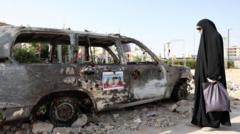A cease-fire agreement leads to conflicting narratives about the war’s outcome, with Iran framing its actions as a decisive win.
**Iran Proclaims Cease-Fire Victory Amidst Ongoing Conflict with Israel**

**Iran Proclaims Cease-Fire Victory Amidst Ongoing Conflict with Israel**
Iranian officials tout success in imposing a truce on Israel despite significant military setbacks.
June 24, 2025, 7:57 a.m. ET
In the latest chapter of the escalating Israel-Iran conflict, Iranian leaders declared victory on Tuesday following their recent strike on a U.S. air base and a subsequent cease-fire with Israel. State broadcasts heralded the cease-fire as Iran's accomplishment, claiming it forced Israel into negotiating an end to hostilities.
Tehran's state media pronounced that the agreement emerged as a result of successful offensives, including an attack on the Al Udeid air base in Qatar, suggesting they imposed the truce on a faltering Israel. This announcement follows a tumultuous 12-day period marked by significant violence, including exhaustive Israeli airstrikes that decimated a large portion of Iran's military hierarchy and capabilities, destroying critical air defense, nuclear, and missile facilities.
Despite these military losses, Iranian officials publicly celebrated their ability to deliver retaliatory strikes, including missile attacks on Israeli territories that reportedly resulted in civilian casualties, as well as the strategic strike in Qatar that avoided American military losses. The narratives from Tehran stood in stark contrast to the reality observed on the ground, where the Israeli military significantly outmatched Iranian forces during the conflict.
Retired Iranian military figures emphasized this as a turning point, claiming their forces not only survived the Israeli onslaught but also successfully retaliated, suggesting a strategic victory of sorts, albeit without the resolution of broader tensions or an end to potential conflict with the United States.
In the latest chapter of the escalating Israel-Iran conflict, Iranian leaders declared victory on Tuesday following their recent strike on a U.S. air base and a subsequent cease-fire with Israel. State broadcasts heralded the cease-fire as Iran's accomplishment, claiming it forced Israel into negotiating an end to hostilities.
Tehran's state media pronounced that the agreement emerged as a result of successful offensives, including an attack on the Al Udeid air base in Qatar, suggesting they imposed the truce on a faltering Israel. This announcement follows a tumultuous 12-day period marked by significant violence, including exhaustive Israeli airstrikes that decimated a large portion of Iran's military hierarchy and capabilities, destroying critical air defense, nuclear, and missile facilities.
Despite these military losses, Iranian officials publicly celebrated their ability to deliver retaliatory strikes, including missile attacks on Israeli territories that reportedly resulted in civilian casualties, as well as the strategic strike in Qatar that avoided American military losses. The narratives from Tehran stood in stark contrast to the reality observed on the ground, where the Israeli military significantly outmatched Iranian forces during the conflict.
Retired Iranian military figures emphasized this as a turning point, claiming their forces not only survived the Israeli onslaught but also successfully retaliated, suggesting a strategic victory of sorts, albeit without the resolution of broader tensions or an end to potential conflict with the United States.























